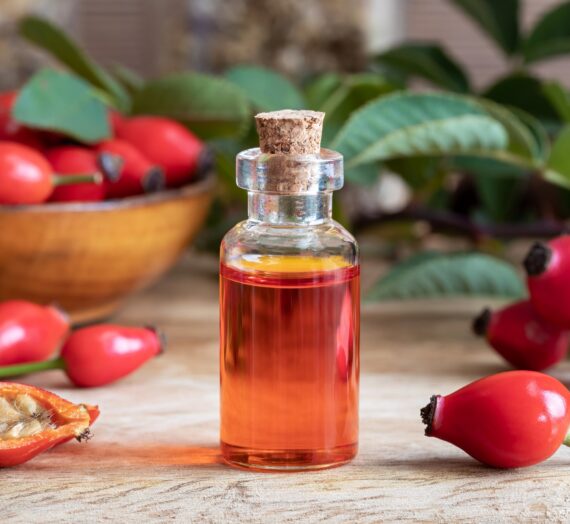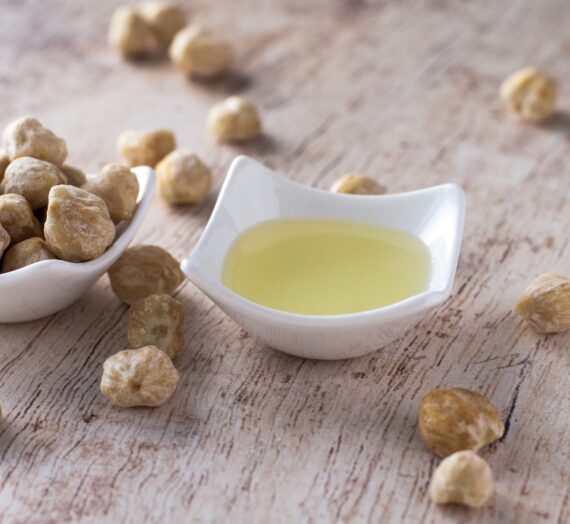When plant oils were still relatively obscure in the world of hair and skin scare, coconut oil was the first to break out, becoming a hugely popular cure-all for anything from split ends to acne to dental health to weight loss.
But more recently, questions have been raised about its reliability. Is it truly healthy for us, despite its extremely high fat content? Does it block pores? Is it beneficial to use coconut oil for beard? We will give you a summary of why and how to use coconut oil for beard below.
In a hurry? Click here to see the most popular beard oil – The Gentlemen’s Brand with the highest numbers of 5-star reviews.
Table of Contents

What is Coconut Oil?
Coconut oil is extracted from the kernel of coconuts as a pure white liquid. At room temperature, coconut oil forms a solid, but melts when it comes into contact with our body temperature.
The versatility of its structure makes it an excellent substitute or base for so many things. For example: from body scrubs to shaving cream to cake mix (no, really!).
Here’s the thing: coconut oil consists of 80% fat. This is why it has stirred up quite a controversy in the healthcare world. It contains good fatty acids that boost metabolism, lower cholesterol, and improve heart and brain health – but it’s so high in calories, there’s some doubt as to its overall benefits.
However, when it comes to topical application, science is leaving less and less room for doubt.
It has been proven that coconut oil boasts a myriad of wow-factor benefits for skin, nails, hair, and of course, beards. Unlike many organic or holistic therapies, the abilities of coconut oil can be backed up with a ton of scientific research. The question lies in whether this wonder-oil is right for you, and your skin type.
What are the Benefits of Coconut oil for Beards?

1) Nourishing the skin and follicles under your beard. Dryness and flaking are very common problems amongst beard-wearers, especially if you have coarse hair. Coconut oil contains essential vitamins E and K, which repair broken skin, making quick work of dry patches and dandruff. It’s important not just to smooth coconut oil onto the surface hairs, but to massage it into the skin underneath to reap the real benefits.
2) Nourishing the hairs of your beard. Proteins are the main building blocks of our hair. Various factors like age, lifestyle, environmental stressors, and styling damage can cause protein depletion. Coconut oil has been proven to reduce this protein loss, allowing hair to retain its strength and integrity. Coconut oil is also better able to penetrate the hair shaft and deliver moisture than some other oils, due to the unique structure of its main fatty acid, lauric acid.
3) Treating common skin conditions and irritations affecting the beard. Coconut oil is a natural anti-inflammatory agent and analgesic. If you have a very long or thick beard, bacteria and fungus can build up underneath the hair, which can cause a musty scent at best, and serious infections at worst! You don’t have to shave it all off to avoid this. However, the natural soothing and anti-fungal qualities of coconut oil can combat these problems. Lavender oil has very similar anti-inflammatory properties.
4) Protecting the skin and beard from external damage. Amazingly, coconut oil has been proven to block 20% of the sun’s rays (compared to the 90% blocked by sunscreen). If sunscreen isn’t part of your daily routine (which it should be in order to prevent premature ageing), coconut oil is at least taking some action to protect you from UV damage. It’s also an antioxidant, meaning it fights unbonded oxygen particles in the air, which can latch onto and damage our natural tissues.
5) Adding shine and softness to your beard. Finally, the conditioning properties of coconut oil act as a shine-enhancer, softener, and a preventer of tangling, keeping all hairs flowing neatly in the same direction. This can help longer or curlier beards to look much more healthy, silky, and tidy. Moreover, it works to reduce the rough feel of coarse hair (your partner will thank you for it!). Many users have reported noticeable softness after using the beard oil from Gentleman’s brand.
Is Coconut Oil Right for my Beard?
If your overall complexion is generally dry, coconut oil is perfect for you. The same applies to normal skin types, and to sensitive and combination ones, as there is nothing harsh in coconut oil to upset the balance.
Even naturally oily skin types can benefit from coconut oil. Although it might seem counterintuitive to some, adding natural plant oils to the skin can combat excess oiliness.
This is because people with oily skin types have overactive sebum (oil) glands. These glands are quick to overcompensate, so trying to dry out oily skin is the worst thing to do. Instead, you need to balance it. Supplying your oil glands with ample moisture can trigger them to scale back on oil production.

The most important thing to consider is the comedogenic scale.
Ranging from ‘0’ meaning zero risk of pore clogging to ‘5’ indicating a high risk of pore clogging, the scale is your key to deciding how much risk your skin can manage. Coconut oil sits at a 4. This means there is a higher risk of pore clogging than other oils.
So, if your skin is dry to normal to slightly oily, you’re likely to benefit from the wonders of coconut oil.
But if you’d describe your skin as ‘very oily’, you might find coconut oil blocks your pores and causes more blemishes or acne than before. You should use Rosehip oil which has a comedogenic scale of only 1.
How do I know what my Skin Type is?

There’s no complicated science to identifying your skin type – you’ll be able to tell by look and feel. Here’s a quick guide to help you:
Dry skin: If you feel tightness after washing, or experience dry patches, especially in winter, you probably have dry skin.
Oily skin: Oily skin can be characterized by shiny patches of skin especially across the nose and forehead. You can test this by blotting the area with tissue. If the tissue comes away with oil on, you likely have oily skin (dry skin will leave no mark). You will likely also be prone to spots or acne if you have this skin type. Man with very oily skin should use a beard oil with lower comedogenic scale to lower the risk of having their pores clogged.
Combination skin: If your T-zone tends to be oily, but you experience dry patches on your cheeks and chin, you may have combination skin. Look for products that mix jojoba oil in with coconut oil for balancing.
Sensitive skin: You may have sensitive skin if you deal with a lot of redness or irritation, or conditions like eczema or rosacea. Harsh artificial soaps or detergents will probably worsen your condition. Coconut oil is anti-inflammatory, so it’s likely to improve rather than worsen symptoms.
Does Coconut Oil Promote Beard Growth?

There is much debate over whether plant oils can actually increase the rate of your hair growth.
So is coconut oil a beard growth oil?
Some studies suggest that the antioxidants in coconut oil fight oxidative damage that may affect testosterone levels in hair follicles, causing hair loss. It makes sense that by removing irritation and build up from the follicles of your beard, coconut oil can help it to grow to its maximum potential. A healthy, nourished follicle is much better able to do its job. In this way, coconut oil may indeed enable healthier growth, and remove obstacles that may inhibit it, but it can’t speed up your natural rate of growth, or encourage thicker hair. It can make your existing hair look healthier and shinier, though.
In addition, studies have shown that obtaining a diet rich in omega 3 + 6 plus topical application of Castor oil will yield the best beard growth results.
The Top 5 Beard Oils for Men:
Unlike some coconut products which only feature tiny amounts of actual coconut oil, it’s the second most concentrated ingredient in Brickell’s Beard Oil For Men. So you’re guaranteed to enjoy its pure, natural benefits in abundance. Brickells have combined coconut oil with another primary ingredient – jojoba oil. This is fantastic news for those with oily skin types, as jojoba oil is famous for its balancing properties.
<Click here to see price on Amazon>
Jojoba oil and other ingredients in this beard oil such as grapeseed oil and hazelnut oil also carry lower comedogenic ratings of between 1 and 2. These other oils bring down the overall risk of pore-clogging, so you can enjoy the nourishment of coconut oil in a much lighter form.
They added zero sulfates, parabens, artificial fragrance or colourings in Brickell’s beard oil. So it’s more than suitable for sensitive skin types too.
It’s a tiny bottle, but it packs a big punch. You’ll only need 2-4 drops each time, depending on the length and thickness of your beard.
#2 The Gentleman’s Premium Beard Oil
This very sophisticated beard oil will be extremely appealing to the modern beard-wearer, and will at the very least look stylish on your bathroom shelf. Extra virgin coconut oil is the primary ingredient here – so it is not diluted down with other, lower-quality ingredients. So you’re sure to benefit from all the fantastic active nutrients and fatty acids coconut oil can offer.
It does include some extra goodies in a lower concentration – namely sunflower seed oil (which has a surprising comedogenic rating of 0!), argan seed oil (which is well known for its nourishing benefits to hair), evening primrose oil, and jojoba oil (which as we know is great for balancing out mixed or oily complexions).
<Click here to see price on Amazon>
It’s unscented, which may be its only disadvantage – some like to substitute the natural scents in beard oils as cologne. But it’s good news for sensitive skin types, as it means there’s nothing artificially fragranced in there which might irritate the skin underneath.
#3 Grave Before Shave Gentlemen’s Blend Beard Oil
Taking a step away from coconut oil, Grave Before Shave uses a much lighter blend of natural plant oils to keep your beard shiny and healthy, and condition the skin underneath. It uses tea tree, apricot oil, jojoba and almond oil to create a surprisingly non-oily, lightweight solution. This is an ideal product for you if you’re concerned coconut oil might be too heavy for your complexion, or if you’re just starting out with oils and want to see how your skin responds.
<Click here to see price on Amazon>
Grave Before Shave Gentlemen’s Beard Oil is also infused with aloe vera, which should help with any post-shave irritation or razor rash. They also scented it with sandalwood and bourbon (we hope the artificial kind!). So you’ll smell great as well as looking stylish and sleek.
You might have noticed jojoba oil popping up a lot in this article, and increasingly in grooming products for men. As we know, jojoba is touted as the best oil for balancing out oily and combination complexions (it can also help to balance out hair that gets greasy quickly).
<Click here to see Price on Amazon>
Valhalla’s beard oil (or ‘Viking Conditioner’ as they enticingly call it) is based on jojoba oil but also contains the very light and low comedogenic scoring grapeseed and argan oils. This is an absolute dream combination for those with oily or acne-prone skin. The solution will leave your beard shiny and healthy, and the skin underneath it clear and nourished. This solution won’t clog your pores, cause further spots, or leave build up. It is also packed with fragrant essential oils like sandalwood, ylang ylang, orange and vanilla – all popular base scents in cologne, so you’ll smell amazing with this one, too.
Finishing with a slightly different functionality, ELEMIS Shave & Beard Oil is designed to substitute your regular shaving foam. Containing similarly light oils to Valhalla’s offering, such as grapeseed, jojoba, almond and hazelnut oil, this product softens the bristles of your beard. It makes your beard ready for shaving. It also creates an organic, protective barrier between your skin and the razor blade.
<Click here to see Price on Amazon>
This product might be particularly suitable for you if you have sensitive skin, or are prone to razor rash or ingrown hairs. The anti-bacterial and anti-microbial properties of the oils will soothe and calm irritation, and get rid of the bacteria that causes it.
FAQ
1. When should I use beard oil?
It’s best to apply beard oil right after you shower. This is when your pores and beard are clean. This will allow best absorption of the beard oil. Simply dry your beard with a towel and leave it slightly damp.
2. How to apply beard oil or coconut oil?
Step 1:
Pour a few drops of oil onto the palm of your hand
Depending on the length and thickness of your beard, you will use 3-4 drops for short beard and up to 10 drops for longer beard.
Step 2:
Rub the oil against your palm and fingers to warm it up. Start off with massaging the oil onto your skin and the roots of your beard. Then slowly work the way down onto the tip of your beard. Make sure the roots are reaping the benefits of the oil and absorbing the nutrients first.
Step 3:
Brush it out with a beard comb. You can make use of the excess oil by rubbing it on your chest hair or scalp of your head.
3. Beard oil vs Beard balm – What is better?
Beard oil is designed for short to medium length beard. It is in liquid form at room temperature. Mixture of natural oils such as coconut oil, argan oil + jojoba oil, castor oil, grapeseed oil, sunflower seed oil etc, are the main ingredients for beard oil. The purpose of using beard oil is to nourish and moisture your beard. Some beard oil with castor oil can assist in promoting beard growth. Beards oil with lemongrass, eucalyptus, and peppermint oil have antifungal + antibacterial properties.
Beard balm is designed for medium to long length beard. It is in wax or soft solid form at room temperature. Most men use beard balm mainly for holding or styling. It also functions as a leave-in conditioner that that moisturizes, nourishes and soothes your beard. Most of the beard balm in the market are made of shea butter and beewax as a base, plus a carrier oil (such as almond oil), plus 1-2 essential oils which gives the scents.
In Conclusion…
Coconut oil boasts probably the most impressive and powerful array of uses. But it’s not a cure-all for everyone. Getting to know your skin type and experimenting with different oils is the best way to find your perfect product. The Gentlemen’s Beard Brand is the most popular brand with over 2000+ users giving a 5-star review.
If you think your skin might be too oily to benefit from coconut oil, try jojoba oil or castor oil for nourishing and grooming your beard and skin. If you want to grow a fuller beard, castor oil is the best beard growth oil.









